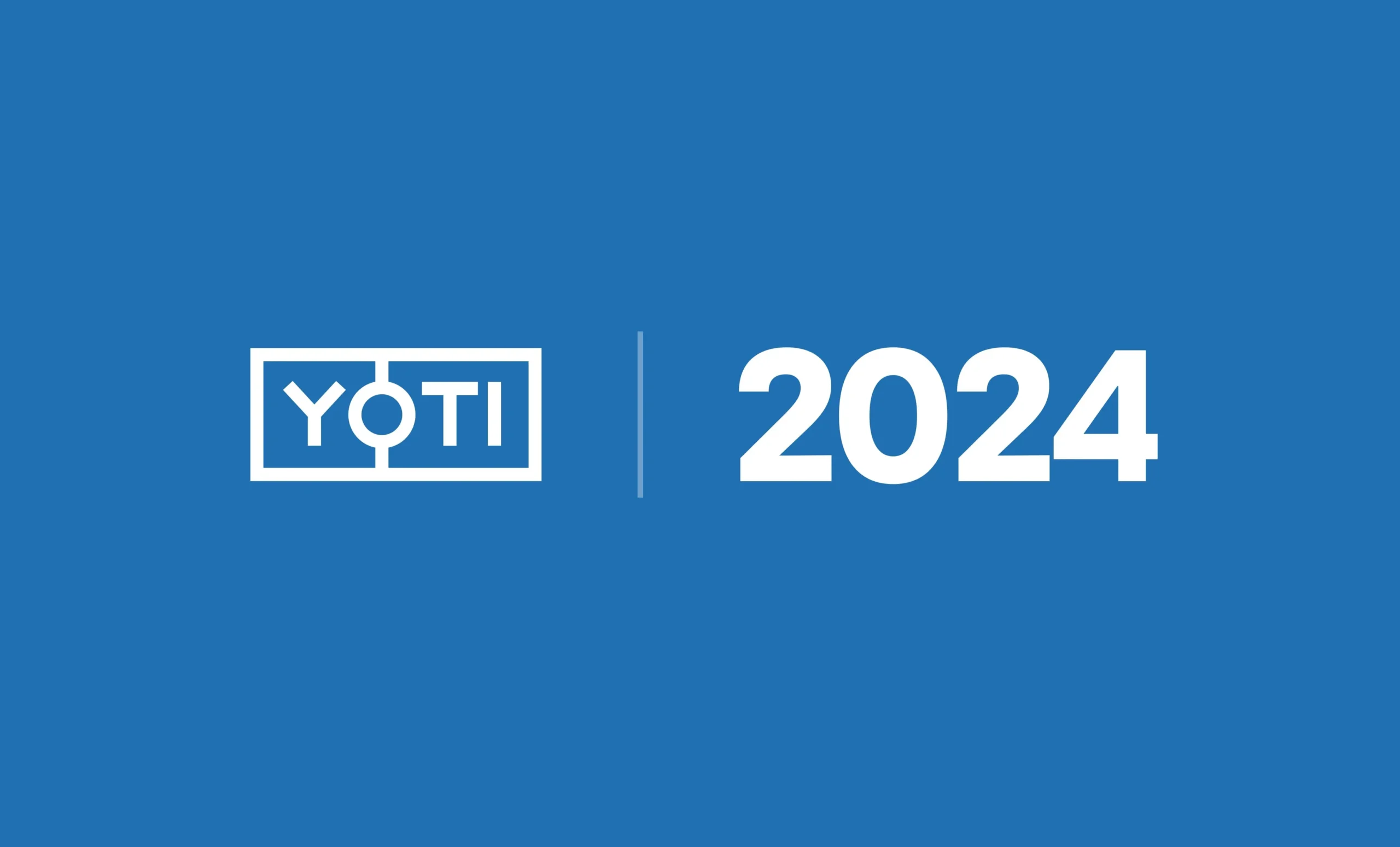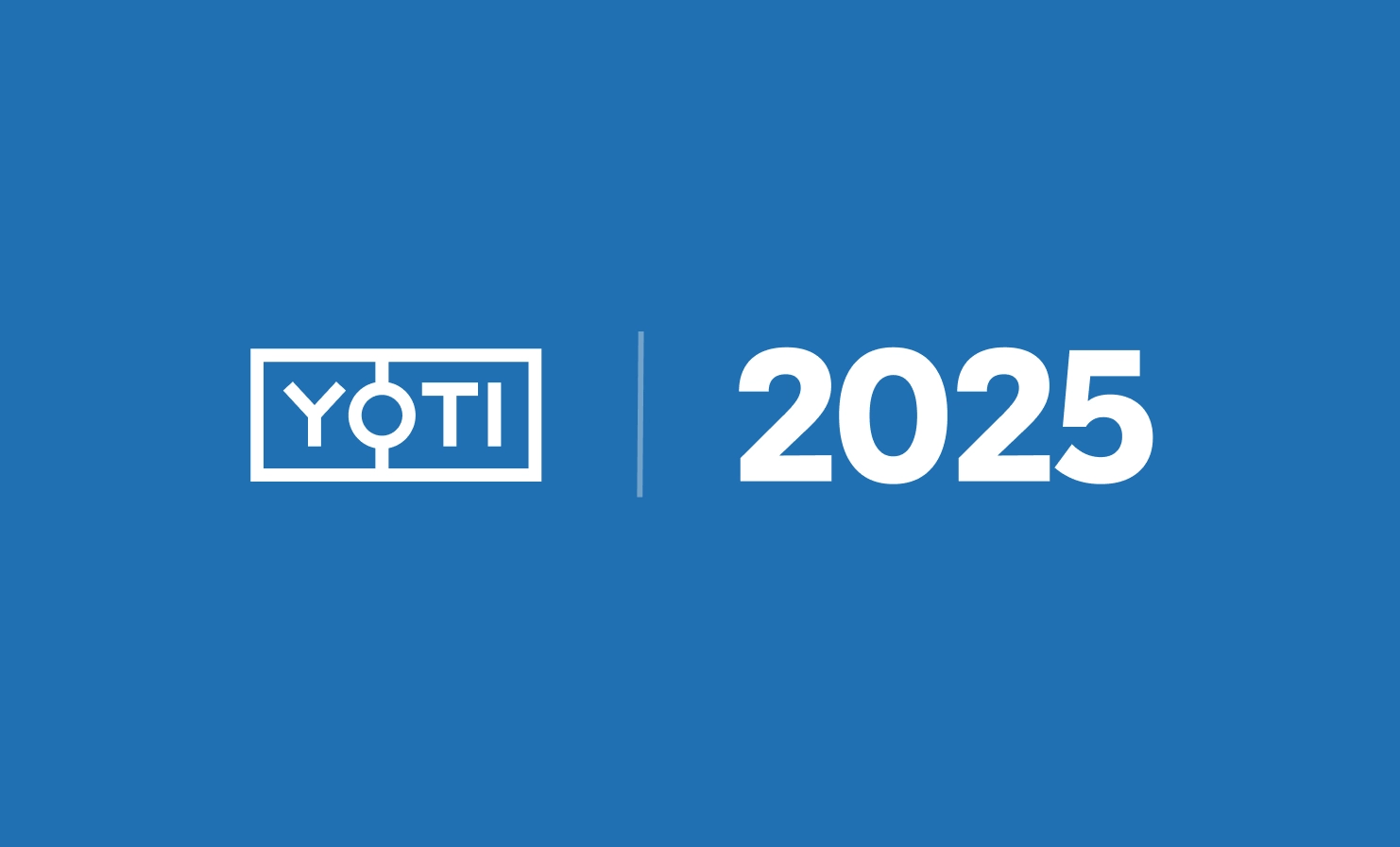
It’s been another busy year for the age and identity industry. A raft of new online safety legislation has been introduced around the world, digital IDs gained momentum, and the accuracy of facial age estimation continued to improve.
It’s also been a really positive year for Yoti. We were named by Deloitte as one of the UK’s fastest-growing technology companies, recertified as a B Corp, and announced some exciting new product features.
Here’s a look back on what’s been going on over the last 12 months.
Digital IDs gained momentum
It’s been great to see the new Data Bill progress, a significant step forward for digital identities and data innovation in the UK. Digital IDs have the potential to transform how we complete everyday tasks, such as buying age-restricted goods and services, collecting parcels, opening bank accounts, and even moving house. They are already being successfully used for employment checks, with 34% of UK adults completing a DBS (criminal record check) with one of our Digital ID apps. The Data Bill should create more opportunities for UK citizens to use digital IDs in even more places.
One of the key opportunities will be for the Government to update the law so that people can use a digital ID to purchase alcohol in pubs, restaurants and shops. Recent plans to allow drinkers to do so using a certified digital identity service provider have attracted significant media attention. The change is rumoured to come in by the end of next year.
As the Government progresses the Data Bill next year, it will be important for different Government departments to be joined up to ensure digital IDs can truly flourish in the UK. They are already recognised for some use cases, but are not currently recognised by bodies like the FCA or the Gambling Commission. We hope that the Regulatory Innovation Office, formed this year, will encourage and support different regulators to work together.
This year, we’ve seen our own Digital IDs gain momentum. We reached five million UK instals and 14 million global instals. Our Digital IDs became PASS accredited for proof of age. We also launched a new Student ID feature – helping students verify their student status. With a verified Student ID, students can quickly and easily prove they are a student, without having to show a physical student card. National Express West Midlands became the first company to accept the Student IDs.
The accuracy of facial age estimation continued to improve
We’ve now completed over 700 million age estimation checks worldwide. Companies continue to choose our technology to check the age of their users in a privacy-preserving and effective way.
This year, the National Institute of Standards and Technology (NIST) published results of their independent testing of different facial age estimation providers. NIST concluded that Yoti facial age estimation is an effective way to check age and age ranges, such as over 18, with an appropriate threshold. NIST also named us as the most accurate facial age estimation provider for 13-16 year olds, a key age group that regulators are concerned with to help keep children safe online.
Our technology enables platforms to accurately check whether a user falls above or below critical age thresholds, such as 13, 16, or 18; key groups of interest for regulators and platforms.
In October, we also had facial age estimation re-evaluated by the Age Check Certification Scheme (ACCS). ACCS now reports that our Mean Absolute Error (MAE) for 18 year olds is just 1.05 years, demonstrating our continued effort to improve the performance of this technology.
As more regulators enforce effective age checks online, independent testing will become increasingly important to give businesses and regulators confidence in the technology. Yoti facial age estimation is ready to help companies comply with the growing raft of age legislations that are set to come into force next year.
Regulators announced more online safety legislation
Over the past 12 months, we’ve seen more regulators around the world announce age checks for adult content and social media platforms:
- In France, Arcom announced that from 11th January 2025, adult operators and platforms with pornographic content will need to check the age of users, ensuring only adults can access this content.
- The new UK Labour Government strengthened the Online Safety Act to include intimate image abuse as a priority offence. This means it must not only be removed when it is found online, but platforms must also proactively remove it and take steps to prevent it from appearing in the first place.
- Peter Kyle, Secretary of State for Science, Innovation and Technology, also urged Ofcom to implement the Online Safety Act ‘as soon as possible’, bringing forward the date of compliance for adult sites. Ofcom has said that in January 2025, they will issue the final age assurance guidance for publishers of pornographic content and expect these duties to become enforceable around the same time.
- The UK Government also published their Draft Statement of Strategic Priorities for online safety. It is clear the Government expects Ofcom to enforce the Online Safety Act promptly and effectively.
- The Australian Government announced a ban on social media for people aged under 16. To support the Federal Government’s proposed ban, there will be a trial to evaluate age assurance technologies for both users over 18 and those aged 13-16. The Age Check Certification Scheme (ACCS) has been selected to lead this age assurance trial. Given how many global companies and age check methods the ACCS has already tested over the last four years, the Australian Government is clearly very serious about optimising these age trials – the results of which are likely to have a global regulatory impact. We look forward to taking part in these important trials, which are likely to have a global impact and influence regulations worldwide.
- Following the Australia government’s announcement, Peter Kyle said he would not rule out a social media ban in the UK, and is keen to see more robust age checks, especially for +/- 13 age gating.
- In the US, two bills were merged to create KOSPA – a legislative package that brings together the Kids Online Safety Act and the Children’s and Teens Online Privacy Protection Act (also known as COPPA 2.0). KOSPA is the first time in nearly 30 years that a piece of legislation protecting children online has been passed in the Senate.
2025 will be a year of action. It will be a significant year for online safety, with a number of regulations coming into effect.
Instagram launched Teen Accounts
In September 2024, Instagram launched ‘Teen Accounts’ for users under the age of 18. Teen Accounts have built-in protections including the ability to set daily usage limits, restrict access during certain hours and monitor their child’s interactions, such as the accounts they are messaging and the types of content they’re engaging with on the platform.
We’re helping Instagram to verify the age of users when users attempt to change their account date of birth from under to over 18. Changing their date of birth to over 18 would allow users to lift the Instagram Teens Account restrictions, so it’s important only people of the appropriate age can do this. Creating different age-appropriate accounts is only possible with effective age assurance technology.
Continued to create age-appropriate experiences online
Facial age estimation is a practical, privacy-preserving and effective way to create age-appropriate experiences. Between January and November this year, we completed over 31 million age estimations for under 18s.
This year, we’ve also continued our work with Yubo, helping them to verify the age of all of their users. With effective age checks, platforms can prevent minors from being exposed to explicit or harmful content, or from coming into contact with predatory adults.
Yoti’s facial age estimation has helped Yubo process over 290 million age checks to date. Of more than 10,000 Yubo users surveyed in October 2024, more than 60% said age estimation has had a positive impact on their overall user experience on the app. Over 53% also said that age estimation increases their trust that the users they interact with on Yubo are real people.
It’s fantastic to see the positive outcomes age assurance can have – including creating safer online environments, boosting user engagement and building trust.
Digital Services Act came into force
The EU’s new Digital Services Act (DSA) came into force on 17th February 2024. The DSA introduces requirements for online platforms, and in particular Very Large Online Platforms (VLOPs), which are platforms that have at least 45 million average active users in the EU. This equals roughly 10% of the total EU population, and as of 31 October 2024, the European Commission has designated 20 VLOPs.
The DSA requires these platforms to implement additional measures to protect minors from harmful content, goods and services. Risks to minors must be mitigated by implementing robust age assurance systems, and avoid using children’s data for targeted advertising, whilst ensuring compliance with the GDPR.
The European Commission also set up a Task Force on Age Verification, whose objective is to foster cooperation with national authorities with expertise in the field to identify best practices and standards in age verification.
Since the DSA came into force, former Commissioner Thierry Breton was very public in his interactions with some VLOPs, signalling a strong desire to see them implement EU rules. It remains to be seen which Commissioner will inherit Breton’s brief in the forthcoming Second Von der Leyen Commission, and what their enforcement technique will be.
Response to the growing threat of deepfakes
Regulatory bodies began passing laws in response to the growing threat of deepfakes:
- The California Governor signed two bills aiming to help shield children from the increasingly prevalent misuse of AI tools that generate harmful sexual imagery of children. Other states such as Louisiana and Florida have also criminalised deepfakes that show minors engaging in sexual conduct.
- In May, France passed the SREN law which supplements Article 226-8 of the French Criminal Code. As part of the SREN Law, France explicitly prohibits the non-consensual sharing of deepfake content unless it’s obvious that the content is artificially generated.
- In August, the EU’s AI Act came into force. Hailed as a landmark piece of legislation, the Act is the first of its kind in the world to address AI systems.
At Yoti, we published our first white paper detailing our approach to combatting Generative AI and deepfakes. We will also be announcing a new solution next year, part of our ongoing efforts to protect businesses and people from deepfakes.
Continued on our ethical journey
We’re proud to be part of a network who are intentional about the impact that they want their business to have. Through being a B Corp, we hope to play a part in changing how business is done. Our recent recertification marks our commitment to helping transform the landscape into one that places equal value on people, planet, purpose and profit.
The assessment covers a wide range of aspects of how our business operates, with impact areas including governance, workers, community, environment and customers. In the year that we hit our 10th anniversary, we published our Impact Report, which details our social and environmental progress over the last year.
Also as part of our accountability framework, we established our Guardian Council back in 2017. It is made up of independent advisors who are experts in their fields. They help us to stay true to our core principles and guide us in our decisions.
This year, we said goodbye to Gavin Starks, one of our founding Guardians, and hello to two new Guardians: Dr. Sindhu Joseph and Dorothy Gordon. You can keep up to date with our Guardians’ work on our website.
There’s so much we’re proud of this year and we can’t wait to see what 2025 has in store.




